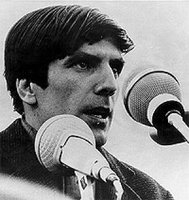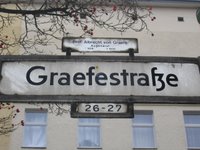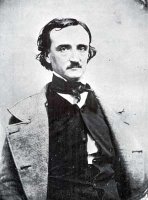
Word on the Street
Tomorrow residents of the Berlin district Kreuzberg-Friedrichshain will vote on whether or not to rename a local street, Kochstrasse, as Rudi-Dutschke-Strasse, in honor of the leader of Germany’s rebellious student movement of the 1960s and partial founder of the Green party. The current honoree Johann Jakob Koch was a baker, and according to members of the Christian Democratic Union, a party that
 opposes the renaming, his service to the city oughtn’t be forgotten. Along with fellow opponent and current Kochstrasse resident Axel Springer Press, against whose conservative papers Dutschke protested, the CDU accuses Dutschke as having been an anti-democracy revolutionary. It is the CDU’s signature-collection initiative to block the renaming that gave rise to the need for a citizens’ vote: after the neighborhood parliament had already decided in favor of the renaming, the CDU was able to prove minority dissent with the signatures. Residents will settle the matter once and for all in the polls tomorrow.
opposes the renaming, his service to the city oughtn’t be forgotten. Along with fellow opponent and current Kochstrasse resident Axel Springer Press, against whose conservative papers Dutschke protested, the CDU accuses Dutschke as having been an anti-democracy revolutionary. It is the CDU’s signature-collection initiative to block the renaming that gave rise to the need for a citizens’ vote: after the neighborhood parliament had already decided in favor of the renaming, the CDU was able to prove minority dissent with the signatures. Residents will settle the matter once and for all in the polls tomorrow.The controversy has split the neighborhood, with signs proclaiming alliance hanging in shop windows. The liberal newspaper taz, which originally proposed the renaming in late 2004, is gearing up for a victory in what it sees as a campaign for justice and proper remembrance. Meanwhile, opponents invoke not only political but also pragmatic objections, calling the measure costly and impractical since companies will have to order new letterhead, among other measures. The taz initiative has already
 made a concession to the municipal transit authority, which claimed the cost of renaming the underground stop on Kochstrasse would be too high. In response, the suggestion was altered such that only a piece of the street would receive a new moniker. If this sounds silly to American readers, it is the norm in Berlin, where what looks like one street on a map may change names two or three times over the course of several kilometers.
made a concession to the municipal transit authority, which claimed the cost of renaming the underground stop on Kochstrasse would be too high. In response, the suggestion was altered such that only a piece of the street would receive a new moniker. If this sounds silly to American readers, it is the norm in Berlin, where what looks like one street on a map may change names two or three times over the course of several kilometers.The amount of hullabaloo over a street name might also be foreign to Americans, who live in a country of usually bland public monikers. This has a lot to do with America’s history of expansion, in which surveyors turned “uncharted territory” into a grid of salable land, relying for simplicity’s sake upon numbers to order the terrain. Despite the existence of verbose personalities such as Henry David Thoreau in their midst, surveyors also tended to be a fairly unimaginative lot, sticking to simple, inoffensive names like “Main” or “Oak” when drawing up their maps. They were, however, business-savvy, frequently numbering the streets starting at ten or even twenty-five to leave room for coming expansion in all directions. In this regard, surveyors were either spookily prescient or self-actualizing purveyors of the contemporary sprawl phenomenon.

Then again, Americans miss out on the arguable cultural flavor of local names. In Berlin, each street also has a plaque somewhere in its stretch that notes the birth, death, and profession of its eponym. When they are singular and denote short stretches, names also become tied irreparably to a place. For example, one justification the Berlin government provided to critics of its decision to build a fifth Rosa Luxembourg monument was that the socialist reformer would otherwise be remembered as an actress: her eponymous plaza lies in front the famous Volksbühne, or People’s theater.
In New York, attempts have been made to bring in the folksiness and character of interesting street names, but how many people know that 84th street in Manhattan’s Upper West Side is also named Edgar Allen Poe Street, after the one-time resident? One would be hard-pressed to find a business or residence that inserts the
 supplemental name on its letterhead. Even a wide-ranging change such as Sixth Avenue to Avenue of the Americas in 1945 is frequently overlooked by natives who go right on calling it, well, Sixth Avenue. It sits in between Seventh and Fifth, does it not? In New York, pragmatism trumps romanticism, it seems.
supplemental name on its letterhead. Even a wide-ranging change such as Sixth Avenue to Avenue of the Americas in 1945 is frequently overlooked by natives who go right on calling it, well, Sixth Avenue. It sits in between Seventh and Fifth, does it not? In New York, pragmatism trumps romanticism, it seems.Yet Berliner Markus Domsch, owner of the local organic grocery “Laib und Käse” [Loaf and Cheese] and neighborhood resident for twelve years, also expresses a practical outlook.
“I’m not voting tomorrow because the name really doesn’t affect me,” he says, referring to his store’s location approximately two kilometers from debated block. “It’s up to the people who live and work there to decide. Whatever they choose democratically is their right.”
Not everyone feels that way. The proprietor of a nearby second-hand bookstore who preferred not to be named displays a large “Vote NO” (to the decision not to rename the street) poster alongside rows of dusty volumes. “He was an important political figure. It’s a shame if they decide not to honor him. It should remain Rudi-Dutschke-Strasse,” she says emphatically, referring to a name the street does not yet officially bear. Her answer hits at one possible linguistic consequence of tomorrow’s vote. Just like New Yorkers to whom “Avenue of the Americas” is a fictional place, Berlin fans of the political activist may refer to the street as Rudi-Dutschke-Strasse regardless of the outcome.
Kochstrasse image courtesy: www.pro-kochstrasse.de Dutschke image courtesy: http://www.stred.org/picdb/43ebc643c598f_t.jpg
Postcard image courtesy:www.taz.de/pt/.1/etc/dutschkestrasse/chronik Poe image courtesy: http://richmondthenandnow.com

No comments:
Post a Comment